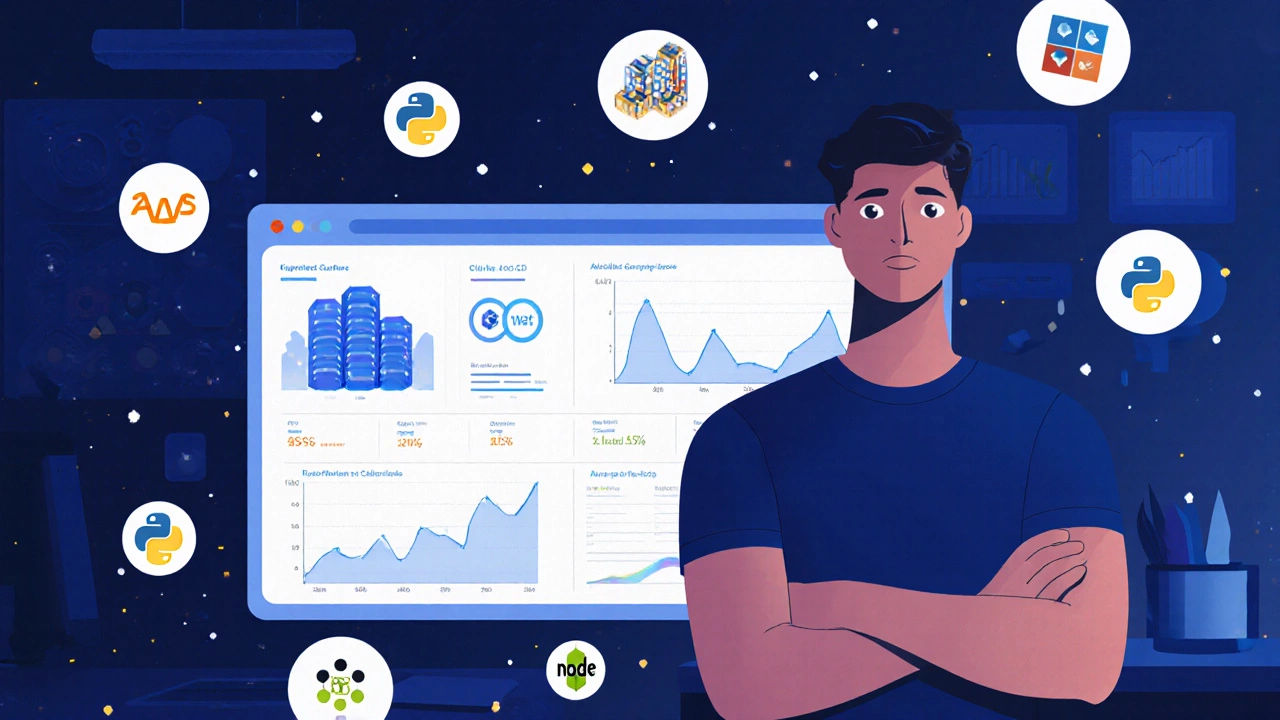Coding Salary Calculator
How much can you earn in 2025?
Estimate your potential salary based on your experience level, specialization, and location in Australia.
Estimated Annual Salary
Based on current Australian market data from 2025
How much money do you actually make from coding? It’s not a one-size-fits-all answer. Some people start earning $50,000 a year right after a six-month bootcamp. Others spend years in university and still struggle to break into six figures. The truth? Your pay depends on where you are, what you code, who you work for, and how much you’ve actually built-not just what you learned in class.
Entry-Level Coders: What You Can Expect
If you’re just starting out, don’t expect to land a $120,000 job on day one. In Australia, entry-level developers with a coding bootcamp certificate or a bachelor’s degree typically earn between $60,000 and $75,000 per year. That’s before tax. In Sydney, where the cost of living is high, $65,000 feels tight. In regional areas like Newcastle or Wollongong, that same salary goes much further.
Companies like Atlassian, Canva, and REA Group pay more than startups, but they also expect more. If you’ve built a portfolio with real projects-like a mobile app that’s live on the App Store, or a website that handles real user traffic-you’ll stand out. One junior developer I know landed a $72,000 job because he had a GitHub repo with a fully functional e-commerce site he built from scratch. He didn’t have a degree. He had proof.
Mid-Level Developers: The Pay Jump
After two to four years, most developers see a big bump. Salaries jump to $85,000-$110,000. This is where specialization matters. If you’re good at JavaScript and React, you’ll get paid well. But if you’re also good at cloud infrastructure-like AWS or Google Cloud-you’ll get paid even more.
Backend developers who work with Python, Java, or Node.js often earn more than front-end coders. Why? Because backend systems handle data, security, and scalability. A single bug in a payment system can cost a company millions. That’s why companies pay a premium for people who understand how to build reliable systems.
One developer in Melbourne told me he went from $78,000 to $105,000 in 18 months by learning how to deploy apps on Kubernetes and setting up CI/CD pipelines. He didn’t take a new job. He just started doing more than his job description asked for-and asked for a raise.
Senior Roles and Specializations: The Big Leagues
Senior developers with five to eight years of experience make $120,000-$160,000. But the real money comes from niche skills. Here are some of the highest-paying areas in 2025:
- AI/ML Engineers: $140,000-$190,000. Companies need people who can train models, not just use pre-built tools.
- DevOps Engineers: $130,000-$170,000. They automate deployments, monitor systems, and keep apps running 24/7.
- Security Engineers: $135,000-$180,000. With cyberattacks rising, every company needs someone who knows how to lock things down.
- Blockchain Developers: $120,000-$160,000. Still a smaller field, but pay is high because there aren’t enough people who know Solidity and smart contracts.
These roles don’t just require coding. They require problem-solving, communication, and the ability to explain complex systems to non-tech people. That’s why they pay more.

Freelancing and Remote Work: Can You Earn More?
Some coders skip the corporate ladder and go freelance. In Australia, freelance developers charge between $60 and $150 per hour. That sounds great-until you factor in taxes, superannuation, sick days, and finding clients.
A freelancer I spoke with in Brisbane makes $110,000 a year working 30 hours a week. But he spends 10 hours a week on admin: invoicing, contracts, chasing payments. He also had to pay $15,000 out of pocket for health insurance last year because he wasn’t covered by an employer.
Remote work for international companies changes the game. An Australian developer working for a U.S. startup might earn $90,000 USD-about $135,000 AUD-because U.S. salaries are higher. But they also pay more in taxes and get no paid leave. It’s a trade-off.
What You Don’t See: The Hidden Costs of Coding Jobs
People talk about salaries like they’re the whole story. But coding jobs come with hidden costs:
- Constant learning: You can’t just learn React once. You need to keep up with new tools, frameworks, and security patches. That means spending evenings and weekends studying.
- Burnout: Many junior developers work 50+ hour weeks in their first year, especially in startups. The pay looks good, but the toll isn’t always mentioned.
- Job insecurity: Tech layoffs hit hard. In 2023 and 2024, over 200,000 tech jobs were cut globally. Even senior developers aren’t safe.
One developer in Perth told me he got laid off after three years at a fintech startup. He spent six months unemployed before landing a new job. He had to take a pay cut. He didn’t have savings. He had to move back in with his parents.

How to Maximize Your Earnings
If you want to make more money from coding, here’s what actually works:
- Build in public: Share your projects on GitHub. Write blog posts. Post on LinkedIn. Employers hire people they can see, not just people with degrees.
- Learn one high-demand skill deeply: Don’t try to learn everything. Master one stack-like Python + Django + PostgreSQL-and become the go-to person for it.
- Work on real problems: Build something that solves a real need. A local business website. An app for students. A tool for freelancers. Real projects beat textbook examples every time.
- Ask for raises: Don’t wait for performance reviews. If you’ve taken on extra work, tracked your impact, and improved systems, ask for a raise. Most managers expect it.
- Network locally: Attend meetups in Sydney, Melbourne, or Brisbane. Many jobs aren’t posted online. They’re filled through word of mouth.
Is Coding Worth It?
Yes-if you’re willing to work hard, keep learning, and accept that the field changes fast. The average coding bootcamp graduate in Australia earns $70,000 in their first year. That’s more than most university grads in arts or social sciences.
But coding isn’t a magic ticket. It’s a skill. And like any skill, your pay reflects your value. The best-paid coders aren’t the ones who memorized syntax. They’re the ones who solved real problems, built things people use, and kept improving even when no one was watching.
If you’re thinking about starting, don’t wait for the perfect course. Start building something today. Even if it’s small. Even if it’s messy. The money comes later. The experience comes now.
How much do beginner coders make in Australia?
Beginner coders in Australia typically earn between $60,000 and $75,000 per year. Pay depends on location-Sydney and Melbourne pay more, but so does the cost of living. Those with strong portfolios or bootcamp certifications often land jobs at the higher end of this range.
Can you make $100,000 as a coder without a degree?
Yes. Many developers in Australia earn $100,000+ without a university degree. What matters is your skill level, portfolio, and ability to solve real problems. Companies like Canva and Atlassian hire based on ability, not diplomas. A GitHub profile with live projects and clean code often beats a degree.
Which coding skills pay the most in 2025?
In 2025, the highest-paying coding skills include AI/ML engineering, DevOps (especially Kubernetes and cloud infrastructure), cybersecurity, and blockchain development. These roles require deep expertise and often involve system design, automation, or security-areas where there’s a shortage of qualified talent.
Is freelancing better than a full-time job for coders?
Freelancing can pay more per hour, but it’s riskier. Freelancers handle their own taxes, insurance, and client hunting. Many earn $100,000-$130,000 annually, but they also work irregular hours and face gaps between projects. Full-time jobs offer stability, benefits, and paid leave. The best choice depends on your risk tolerance and discipline.
Do you need to work long hours to earn well in coding?
Not necessarily. High pay comes from skill, not hours. But many junior developers feel pressure to work overtime to prove themselves. As you gain experience, you’ll find companies that value efficiency over hustle. The best-paid coders focus on delivering results, not logging hours.
How long does it take to reach a six-figure salary in coding?
Most developers reach $100,000+ within 3 to 5 years of starting. Those who focus on high-demand skills like cloud computing, security, or AI can hit that mark in 2 years. It’s not about how long you’ve been coding-it’s about what you’ve built and how much value you’ve delivered.
If you’re serious about making money from coding, stop chasing courses and start building. Build something today. Build something tomorrow. Keep going. The paycheck follows the proof.

